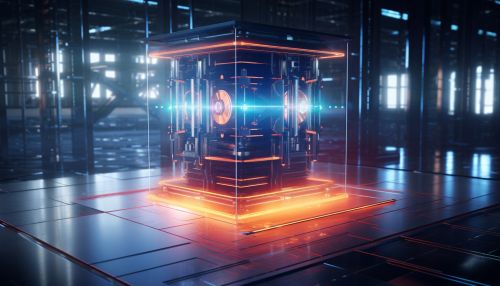Quantum Technology
Introduction
Quantum technology is a rapidly developing field that leverages the principles of quantum mechanics to create advanced technological solutions. These technologies are based on the unique properties of quantum systems, including superposition, entanglement, and quantum tunnelling, which are not observable in classical systems.


Quantum Mechanics and Quantum Technology
Quantum mechanics is the branch of physics dealing with the smallest particles in the universe, such as atoms and subatomic particles like electrons and photons. It describes the behaviour of these particles in a way that is fundamentally different from classical physics. Quantum technology applies these principles to develop new devices and systems.
Superposition
In quantum mechanics, superposition refers to the ability of a quantum system to exist in multiple states at once. This property is used in quantum computing, where quantum bits, or qubits, can represent both 0 and 1 simultaneously, unlike classical bits that can be either 0 or 1.
Entanglement
Quantum entanglement is another key principle in quantum mechanics. It refers to a phenomenon where two or more particles become interconnected and the state of one particle immediately influences the state of the other, regardless of the distance between them. This property is used in quantum communication and quantum cryptography for secure information transfer.
Quantum Tunnelling
Quantum tunnelling is a quantum mechanical phenomenon where particles can pass through potential barriers that would be insurmountable according to classical physics. This property is used in quantum devices such as scanning tunnelling microscopes and quantum dots.
Quantum Technologies
Quantum technologies are a new generation of devices and systems that use quantum mechanics to significantly improve performance over their classical counterparts. These include quantum computers, quantum sensors, quantum cryptography, and quantum communication systems.
Quantum Computing
Quantum computing is a type of computation that uses quantum bits (qubits) instead of the classical bits used in traditional computing. Quantum computers can process a vast number of computations simultaneously, making them potentially much more powerful than classical computers for certain tasks.
Quantum Sensing
Quantum sensing involves using quantum systems to measure physical quantities with unprecedented precision. Quantum sensors can measure various parameters such as time, temperature, pressure, and magnetic fields with higher accuracy than classical sensors.
Quantum Cryptography
Quantum cryptography uses the principles of quantum mechanics to secure communication. It enables the creation of cryptographic keys that cannot be intercepted without detection, providing a high level of security against eavesdropping and hacking.
Quantum Communication
Quantum communication involves using quantum states to transmit information. It leverages quantum entanglement to enable secure communication over long distances, which is a significant advancement over classical communication methods.
Future of Quantum Technology
The future of quantum technology is promising, with potential applications in various fields including computing, communication, cryptography, and sensing. However, there are still significant challenges to overcome, including the development of stable qubits, efficient quantum algorithms, and scalable quantum systems.
